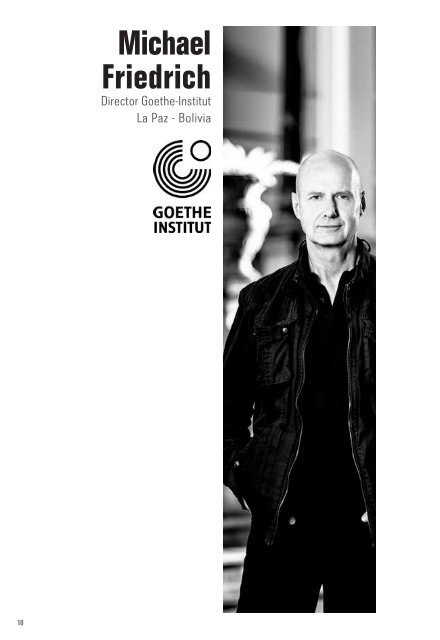TalentDOC Katalog
TalentDOC Katalog
TalentDOC Katalog
You also want an ePaper? Increase the reach of your titles
YUMPU automatically turns print PDFs into web optimized ePapers that Google loves.
Michael<br />
Friedrich<br />
Director Goethe-Institut<br />
La Paz - Bolivia<br />
<strong>TalentDOC</strong>, Cochabamba 2013, un sol radiante en agosto después de una extraordinaria nevada, que puso en riesgo<br />
la llegada de nuestros expertos y de los nueve finalistas preseleccionados en Bolivia, Ecuador y Perú, siguió una<br />
semana intensa de trabajo, charlas y debates acerca del estado del cine documental latinoamericano en general y<br />
acerca de los nueve proyectos finalistas en particular. Todo ello en un ambiente espectacular que nos brindó, con<br />
mucho amor y compromiso, en su sede, la Fundación Simón I. Patiño.<br />
¿Por qué razón el Goethe-Institut – en Bolivia en cooperación con la Alianza Francesa - comenzó este proyecto ¿Por<br />
qué cine documental<br />
El cine documental es el medio por excelencia para analizar tanto estados de conciencia propios como ajenos y<br />
abre ventanas hacia la propia realidad. Los tres paises andinos participantes, Bolivia, Ecuador y el Perú viven su<br />
realidad en la tensión – también en la riqueza cultural - creada entre las fuertes culturas indígenas originarias, las<br />
influencias foráneas y las sociedades globalizadas de información. Es el cine documental de autor que se muestra<br />
cada vez más capaz de describir los procesos y los conflictos que conlleva la búsqueda de una identidad individual<br />
y colectiva en un mundo cada vez más sincronizado por las mega-industrias culturales.<br />
El los últimos 15 años, el cine documental ha vivido un auge y se han logrado grandes resultados en conceptos de<br />
dramatización, de estructura fílmica, etc. Ha sido muy importante el cambio de enfoque del cine documental de<br />
autor que no intenta esconderse detrás de una falsa objetividad sino que muestra deliberadamente la mirada del<br />
director que no disimula esconderse. Así, el cine documental se convierte en un gran medio de reflexión social,<br />
político y cultural. De esa nueva calidad artística del documental toman nota hasta los grandes festivales de cine<br />
como el Festival de Venecia 2013, donde el primer premio, el León de Oro, fue para la película documental “Sacro<br />
GRA” de Gianfranco Rosi.<br />
En un proceso de selección a diferentes niveles, el <strong>TalentDOC</strong> buscó a jóvenes talentos en el ámbito del cine<br />
documental artístico. Con este proyecto esperamos que dentro del contexto de la cooperación cultural entre nuestros<br />
paises hayamos podido poner nuestro granito de arena para el fortalecimiento del cine documental en América Latina.<br />
<strong>TalentDOC</strong>, Cochabamba 2013; a radiant August sun after an extraordinary snowfall —which jeopardised the arrival<br />
of our experts and the nine pre-selected finalists in Bolivia, Ecuador, and Peru— gave us the welcome to the<br />
intense week ahead. The event was made up of hard work, conversations, and debates about the current state<br />
of Latin American cinema in general, and the nine projects selected as finalists in particular. This all took place<br />
in a spectacular setting offered to us with much love and commitment by the Fundación Simón I. Patiño at their<br />
headquarters.<br />
Why did the Goethe-Institut —in collaboration with the Alliance Française— decide to launch this project And why<br />
around documentary cinema<br />
Documentary cinema is, par excellence, the medium with which to examine both foreign and internal states of<br />
consciousness, as well as opening windows towards reality itself. The three Andean participating countries’ realities<br />
are marked by the tension —and richness— produced by the confluence between indigenous cultures, foreign<br />
influences, and globalised information societies. Creative documentary filmmaking is increasingly able to describe<br />
the processes and conflicts that come with the quest for an individual and collective identity in a world increasingly<br />
synchronised by the cultural mega-industries.<br />
Over the past 15 years, documentary filmmaking has experienced an apogee and great results have been achieved<br />
in the areas of dramatization, film structure, etc. The change of emphasis towards creative documentary filmmaking<br />
has been especially important. The latter doesn’t attempt to hide behind a false objectivity, but instead deliberately<br />
shows the director’s individual vantage point, which doesn’t attempt to remain concealed. In this way, documentary<br />
filmmaking becomes an important means through which to reflect about social, political, and cultural topics. Even<br />
large film festivals now take note of this new artistic quality of documentaries. For example, the first prize (the<br />
Golden Lion) in the 2013 Venice Festival, went to “Sacro GRA” a documentary film by Gianfranco Rosi.<br />
As part of a multi-level selection process, <strong>TalentDOC</strong> sought out young talents in the field creative documentary<br />
filmmaking. In the context of cultural cooperation between our countries, we hope that with this project we have<br />
been able to contribute with a grain of sand towards strengthening documentary filmmaking in Latin America.<br />
10 11


